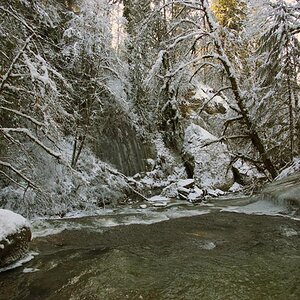ChickenFriedRyce
TPF Noob!
- Joined
- Dec 13, 2007
- Messages
- 208
- Reaction score
- 0
- Location
- Charlotte
- Website
- www.flickr.com
- Can others edit my Photos
- Photos OK to edit
..In your opinion? I'm right now using a Nikon 4004s.
I just went through my first roll of Black and White Kodak TX 400 24 exposure film today and an old roll of Kodak Gold 200.
Just wondering because I was told shooting film sharpens skills. I'm getting them developed soon. Any reccomendations with that too? Or could I go to Walgreens?
I just went through my first roll of Black and White Kodak TX 400 24 exposure film today and an old roll of Kodak Gold 200.
Just wondering because I was told shooting film sharpens skills. I'm getting them developed soon. Any reccomendations with that too? Or could I go to Walgreens?





![[No title]](/data/xfmg/thumbnail/30/30871-c87f97bf2d9d493b4c08ba6482680038.jpg?1619734488)








